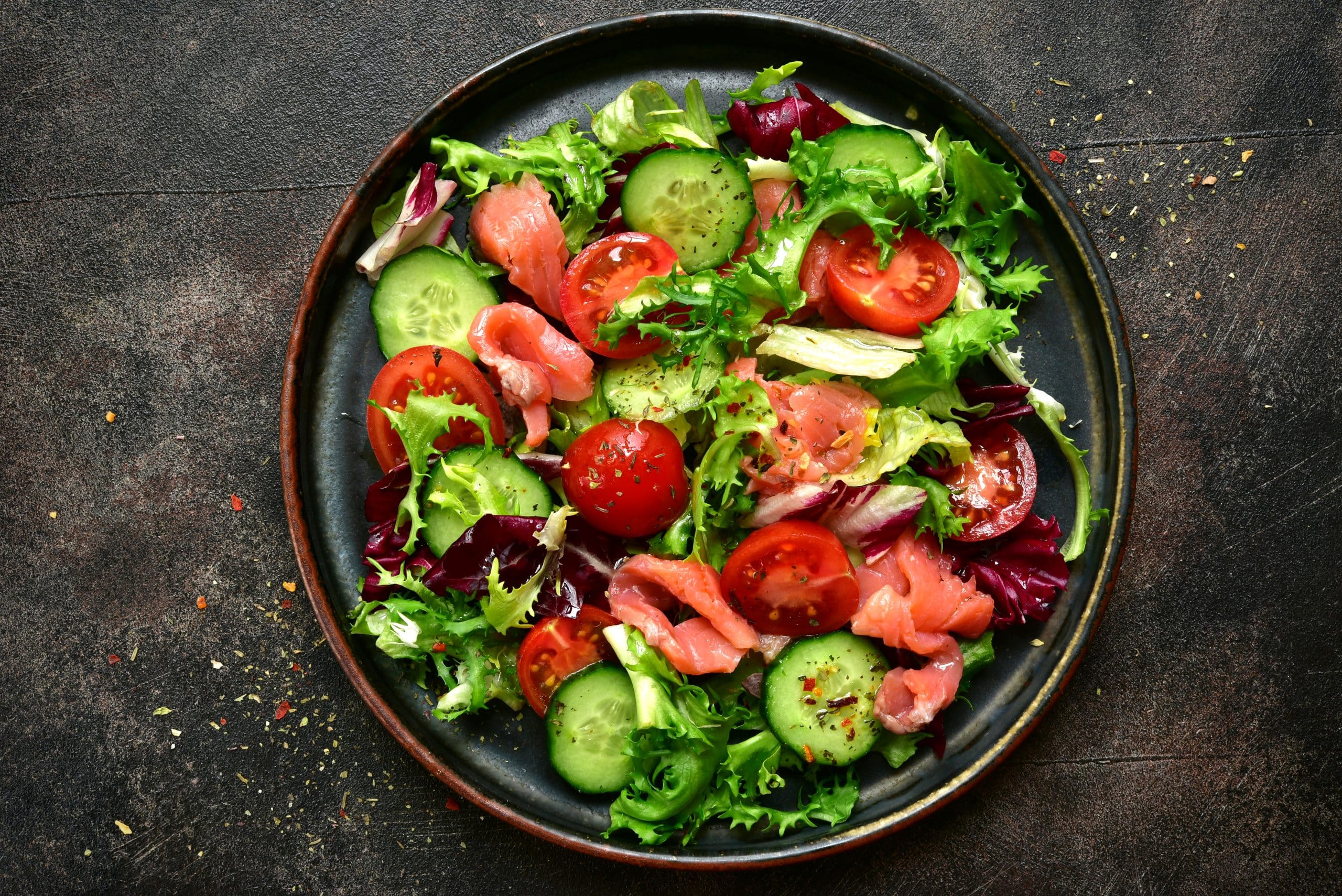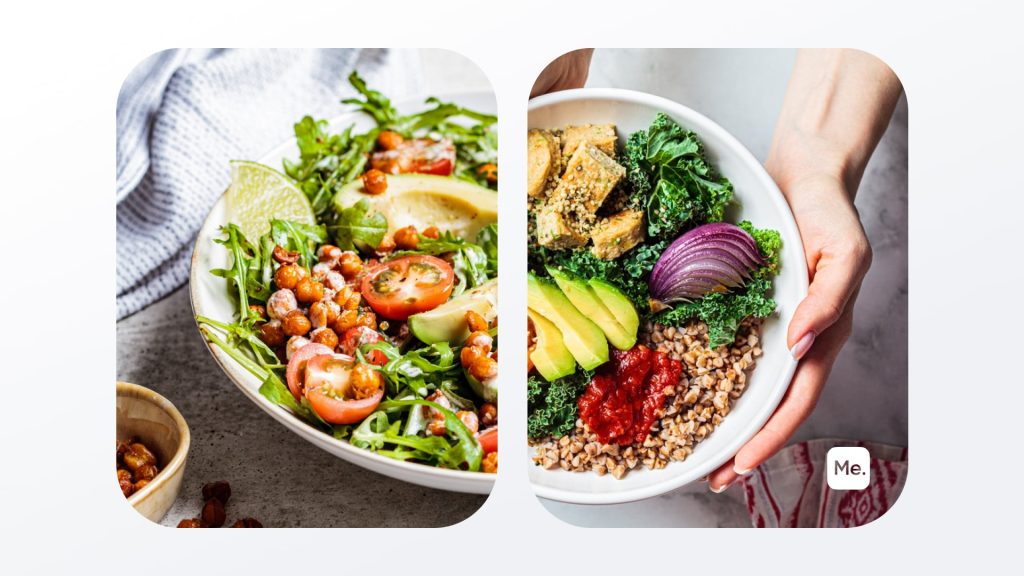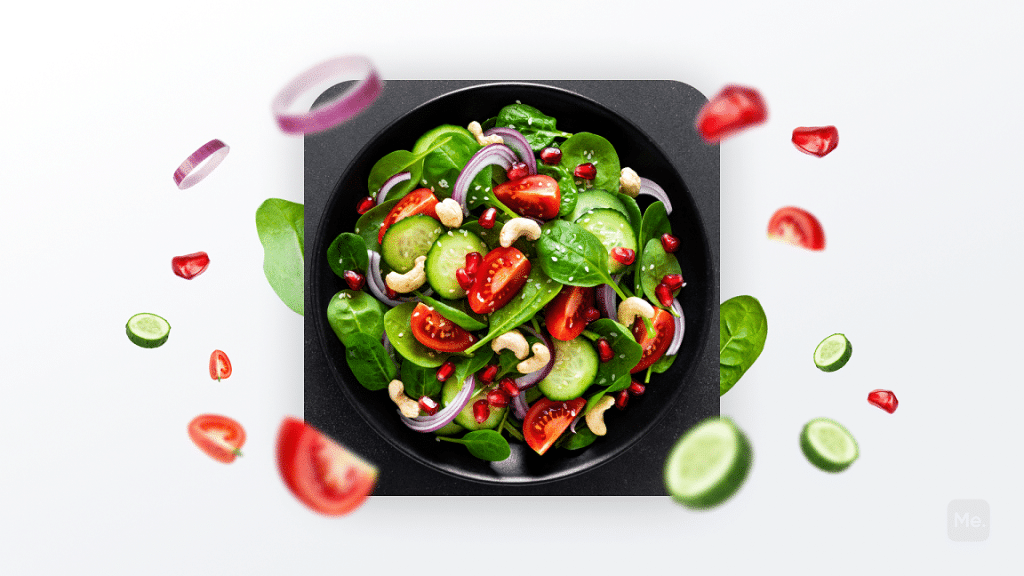Is salad good for weight loss? When it comes to healthy eating and weight loss, salads are practically the poster child for this. In fact, the reputation of salads for weight loss is so big that almost anyone who wants to shed a couple extra pounds automatically starts buying more vegetables and fruits at the grocery store.
However, are salads good for weight loss or have we been misinformed on what to eat to shed those unwanted pounds? If you’re interested to learn more about this, stick around to learn if and how this light meal can help your fitness journey, what salad is good for weight loss, how to make a healthy salad for weight loss and much more.
Is Salad Good For Weight Loss?
Yes, salad is in fact good for weight loss and here’s why
Salads are rich in vitamins and minerals
Many people may not even think about it, but the first step to healthy weight loss is a healthy immune system. A salad is made up of vegetables which are usually rich in vitamins and minerals – which not only help keep your metabolism working smoothly but also keep your immune system strong.
According to a study published in 2022 in the Current Opinion In Food Science journal, for a food immune response (basically how the body defends itself against the substances it sees as harmful or foreign), one needs to consume sufficient amounts of a range of essential and non-essential nutrients and other bioactives, mainly from a plant-based diet (2).
Salads prevent overeating
One of the reasons why people gain weight or fail to lose weight when they want to, is because they tend to eat more than their bodies need – or rather, they consume more calories than they expend. When you eat more calories than you need, your body ends up storing it as fat which leads to weight gain.
Vegetables are usually high in fiber, which when consumed, keeps you full longer (fiber takes longer to digest), which will help curb overeating. In a study published in 2019 in The Journal of Nutrition, researchers found that an increased fiber intake – without looking at macronutrient or even caloric intake – helps promote weight loss and can even help people on a diet stick to it without falling off (1)
When you feel full, you consume less calories and eventually, being on a calorie deficit over a long period leads to weight loss.
Read More: The Best Power Salads For A Healthy Lunch
More vegetables in your diet means more weight loss, science says
The commonly spread theory that eating more vegetables will mean more weight loss is in fact, scientifically proven.
In a study published in early 2014, researchers found that a higher dietary intake of vegetables led to more weight loss in overweight adults. In the study, 120 overweight adults were divided into two groups. Both groups ate a relatively similar healthy calorie deficit diet with the main difference being that one group ate twice the amount of vegetables that the other group ate.
After a year of this, researchers found that while both groups did indeed lose weight, the people in the group that consumed more vegetables in their diet had lost more weight than the other group. Researchers concluded that consuming a higher proportion of the dietary energy as vegetables may support a greater weight loss in overweight people (6).
In a study review published in 2018, researchers looked at 10 studies to try and find the relationship between veggie intake and weight loss. The results showed the following (5)
- Increased vegetable intake led to weight loss
- Increased vegetable intake was highly associated with a reduced risk of weight gain and overweight or obesity
- Eating more vegetables also led to a decrease in waist circumference in women
Which Salad Dressing Is Good For Weight Loss?
Unfortunately, the best salad dressing for weight loss is not the one you buy at your local grocery store. While these dressing are undoubtedly creamy and delicious, most of them are usually high in sugar, unhealthy fats, and are very high in empty calories. The minute you add them to your salad, they change your healthy low calorie meal into an unhealthy calorie dense meal that does more harm than good to your body and fitness goals.
To ensure that your dressing is as healthy as possible, we suggest that you make a homemade one – just store it in an airtight container in the fridge. Some simple yet healthy homemade dressings include
Lemon Vinaigrette
Ingredients:
- 1/4 cup fresh lemon juice
- 1 small garlic clove, grated
- 1 tsp Dijon mustard
- 1/4 tsp sea salt, more to taste
- Freshly ground black pepper
- 1/2 tsp honey or maple syrup, optional
- 1/4 to 1/3 cup extra-virgin olive oil
- 1/2 tsp fresh or dried thyme, optional
Pour all the ingredients in a mason jar, cover it tightly and shake the jar till everything is combined.
BetterMe app will kick you out of the mental funk, shake off your extra weight, rid you off your energy-zapping habits, and help you sculpt the body of your dreams. Intrigued? Hurry up and change your life for the better!
Green Goddess Dressing
If you want to add more herbs to your salads, this is the way to go
Ingredients:
- 1 container plain Greek yogurt (about 2/3 cup)
- 1 cup fresh herbs (mix what you have on hand)
- 1 garlic clove, chopped
- 1 lemon, freshly squeezed
- 1/2 tsp. salt
- 1/2 tsp. fresh ground pepper
Put all the ingredients and pulse till everything is smooth and well combined. Store in the fridge for up to 2 weeks.
Peanut Butter Dressing
This dressing not only goes well with salads, but it can also be drizzled on lettuce wraps or even spring rolls!
Ingredients:
- ¼ cup peanut butter
- 1 chopped garlic clove
- 2 tsp chopped fresh ginger
- 2 tbsp rice vinegar
- 2 tbsp low sodium tamari or soy sauce
- 2 tbsp maple syrup
- A pinch of cayenne pepper, optional
- A bit of water to thin it
Put all ingredients in a blender and blend till smooth. Store in the fridge for up to a week.
Sesame Ginger Vinaigrette
Sesame and ginger are largely used in Asian cuisines so this dressing will go well with an Asian inspired salad
Ingredients
- 2 tbsp sesame oil
- 2 tbsp low-sodium soy sauce
- 2 tbsp rice wine vinegar
- 2 tbsp olive oil
- 2 tbsp honey
- 1 tbsp freshly minced ginger
- 1 minced garlic clove, minced
- 1 tsp Sriracha
Whisk all ingredients together in a small bowl or blend everything together till smooth.
Read More: The Top 6 Winter Green Salad Recipes
What Not To Add To Salad Recipes For Weight Loss?
If you’d like to keep your salad as healthy as possible, it is best to avoid some popular ingredients as they will very likely turn a healthy weight loss friendly meal into something unhealthy and not good for you.
Some ingredients to avoid include
- Anything deep fried – Fried foods might be delicious but they are very high in calories. Deep frying adds a ton of calories to foods which will very likely ruin your calorie deficit diet.
- Simple carbs eg croutons – Many people love to add croutons or even tortilla chips to their salads to introduce a bit of texture. Simple carbs like these are not good for weight loss as they are digested quickly, causing spikes in blood sugar and making you feel hungry sooner. This short-lived fullness leads to overeating and eventual weight gain.
- Bacon – Normal bacon is very high in fats. If you still want to add it to your salads, we suggest choosing leaner bacon cuts or switching to turkey bacon.
- Store bought dressings – As mentioned above, they often have very fatty ingredients as well as high sugar content.
FAQs
Is Caesar Salad Good For Weight Loss?
Yes and no. The original caesar salad that we know and love is not as healthy as we may assume – due to the cheese and high-fat high-sodium dressing that comes with it. These two things (especially the dressing) adds a lot of unnecessary fats and empty calories to your salad.
To make a caesar salad more healthy and thus weight loss friendly, we suggest replacing the original dressing with a healthier homemade version – use some buttermilk or plain yogurt to mimic the creaminess.
Is Chicken Salad Good For Weight Loss?
Yes, a chicken salad is actually very good for weight loss. Not only are the vegetables full of antioxidants that are good for your health, but they are rich in fiber which helps with satiety. On the other hand, chicken is a fantastic source of protein. Protein not only keeps you full but this macronutrient is also known to help boost your metabolism – two factors that enable weight loss.
However, just as with the caesar salad, you must be aware of the ingredients that you add to your salad.
- Mayonnaise is full of unhealthy fats and empty calories. Substitute it with either Greek yogurt or some avocado
- Do not use fried chicken in the salad. Fried foods are high in trans fats.
Is Seaweed Salad Good For Weight Loss?
Yes, it is. Seaweed is not only low in calories, but it is also rich in fiber which helps with satiety, as well as the chemical fucoxanthin which (in animal studies) has shown to help metabolize fats and reduce blood sugar levels (3, 4).
The Best Salad Ideas For Weight Loss
If you’d like to make your own homemade salads for weight loss, here some tips to ensure that not only is it healthy and weight loss friendly, but also delicious
-
- The more the vegetables the better – They are low in calories, full of fiber and will keep you full.
- Always have a protein source – Most people tend to hate salads because they feel like eating just vegetables is ‘rabbit food’. If you fall in this category, adding some protein avoids this feeling and also keeps you full and your metabolism working. Some healthy protein sources include chicken, eggs, tuna (packed in water), other seafood like shrimp, salmon and crab meat, beans, lentils, chickpeas, tofu, etc.
- Carbs – No, carbohydrates are not bad for weight loss. The type of carbs you take as well as the amount is what dictates your weight loss. Some good carbs to use as a base for your salads include corn, quinoa, sweet potatoes, whole wheat pasta, black, brown or wild rice, bulgur, couscous, etc.
- Keep your dressing healthy
- Healthy fats – Fantastic options include avocados, nuts like almonds, walnuts, cashews, and pecans as well as seeds such as pumpkin, sunflower, flax, sesame, and chia.
The Bottom Line: Is Salad Good For Weight Loss?
Yes. Salads are indeed great for weight loss. However, they can be ruined if you added the wrong ingredients. Always be careful to use healthy ingredients and if possible, have homemade salads.
DISCLAIMER:
This article is intended for general informational purposes only and does not serve to address individual circumstances. It is not a substitute for professional advice or help and should not be relied on for making any kind of decision-making. Any action taken as a direct or indirect result of the information in this article is entirely at your own risk and is your sole responsibility.
BetterMe, its content staff, and its medical advisors accept no responsibility for inaccuracies, errors, misstatements, inconsistencies, or omissions and specifically disclaim any liability, loss or risk, personal, professional or otherwise, which may be incurred as a consequence, directly or indirectly, of the use and/or application of any content.
You should always seek the advice of your physician or other qualified health provider with any questions you may have regarding a medical condition or your specific situation. Never disregard professional medical advice or delay seeking it because of BetterMe content. If you suspect or think you may have a medical emergency, call your doctor.
SOURCES:
- Fiber Intake Predicts Weight Loss and Dietary Adherence in Adults Consuming Calorie-Restricted Diets: The POUNDS Lost (Preventing Overweight Using Novel Dietary Strategies) Study (2019, academic.oup.com)
- Foods to deliver immune-supporting nutrients (2022, ncbi.nlm.nih.gov)
- Fucoxanthin from edible seaweed, Undaria pinnatifida, shows antiobesity effect through UCP1 expression in white adipose tissues (2005, pubmed.ncbi.nlm.nih.gov)
- Seaweed carotenoid, fucoxanthin, as a multi-functional nutrient (2008, pubmed.ncbi.nlm.nih.gov)
- The Relationship between Vegetable Intake and Weight Outcomes: A Systematic Review of Cohort Studies (2018, ncbi.nlm.nih.gov)
- Weight loss effects from vegetable intake: a 12-month randomised controlled trial (2014, ncbi.nlm.nih.gov)











